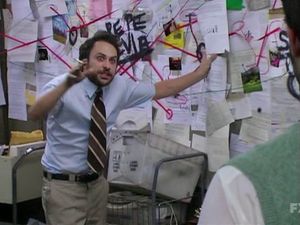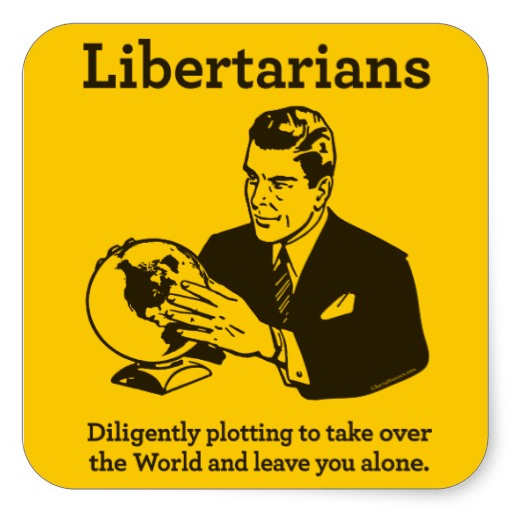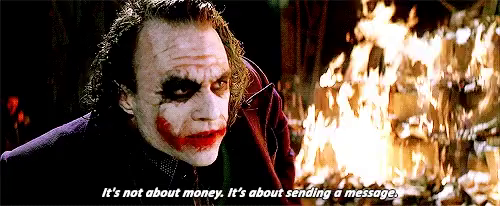LP and Chill: It’ll Be Just Fine – the Short Version

Sometimes we see a pattern, and we try to explain it, and…we end up looking like this crazy conspiracy theory guy. Not because what we’re saying is far-fetched, more because it’s so interconnected and there are so many examples and we care about it so so much that it’s hard to be clear about the points we’re trying to make. More than once, this has pointed us at toward the full explanation of the pattern ending up a longer-form piece of content – like a talk, or “maybe some day a book,” or…we don’t really know. Just..some stuff is too long or too complex for a blog, despite that being where we usually start when we want to talk about something outside of the context of “work stuff.”
Sometimes, though, we find that we can do a summary, or a short(er?) version, of the explanation of the pattern. We’ve been seeing, and writing, more about politics lately, especially the Libertarian Party (LP), because the crazy of the world has led us both to open our eyes about it. And…there are reasons that we think politics might be part of the overall answer, and that is the pattern we want to talk about.
There is a Culture War
Are you happy with the United States political system? This question is not, are you happy in relation to what came before, or are you happy ish, but are you really, truly happy about the people in charge of making, enforcing, and talking about the policies that affect your personal freedoms every day?
If you’re not happy with it, do you feel comfortable talking about that? Do you think that your friends and loved ones and coworkers and various other tribes will still accept you if you’re honest about the problems you see and how those problems make you sad, or hopeless, or angry? Because…we aren’t happy with the current system. And our comfort with talking about that varies, but…most of the people Laine at least interacts with on a daily basis just seem really happy that Not Trump is president.
The fact that the current state is depressing, and frustrating, and that we can’t talk about that without alienating ourselves, is a sign of a large-scale, many-factioned culture war. The Corpo State/Cathedral, the Woke, the Karens, the Conservative Christians, the Antifa’ers, the BLM’ers, the Thin Blue Liners… this isn’t even all of the factions, but all of these groups seem to exist primarily to tell people that saying or feeling something that the group doesn’t approve of makes that person a terrible human being who deserves to be dehumanized and disregarded.
[The factions] seem to exist primarily to tell people that saying or feeling something the group doesn’t approve of makes that person a terrible human being who deserves to be dehumanized and disregarded.
COVID has been a mess, and has added the Masker, Vaxxer, Anti-Vaxxer, Lockdowner, and Anti-Lockdowner factions. What is irrefutable is that the lockdowns that were supposed to keep us all safe have caused mental health crises, increased suicides, increased incidences of abuse, and business closures, with no end in sight because we have no coherent metrics for when it will be “safe enough” to go back, or forward, to some semblance of normal.
It Sucks
The culture war, that is. It sucks to be hopeless, and to be too afraid to talk about it. And with that many factions constantly sniping at each other, sometimes the hopelessness and the fear seem…legit.
It Leads to Actual Life-Threatening Conflict/War
In addition to leading people to live in fear, this culture war leads to actual war, if we use the “life-threatening conflict” definition of war. The government is willing to use force and violence to enforce whatever it thinks is important, mostly in the form of the police, although sometimes with agencies like the ATF. There are historical events, like Waco, and also current events, like insurrection and riots in Minnesota and on the west coast just this week. People think that the police are the bad guys for all the damage they do, and while an argument could be made that they’re choosing to enforce laws that are non-sensical and damaging, it definitely seems true that they’ve been handed an impossible task that will see them also getting hurt in the process.
People think that police are the bad guys for all the damage they do…but it seems true that they’ve been handed an impossible task that will see them also getting hurt in the process.
Some People Love the Culture War…
On the other hand, this culture war is great for some people. It distracts most of the American public from noticing that their freedoms are being slowly leeched away in the name of “safety.” It also helps people in positions of authority further cement those positions because they can position themselves as the saviors of humanity – or, they can use fear and intimidation to get compliance if not support.
The culture war also gives the people who are happily part of those factions a way to convince themselves that they’re right – they can simply be louder, and look around to see the people who are nodding in agreement, and then temporarily feel safety in numbers. The people nodding in agreement, even if they aren’t quite sure, can also find some feeling of safety because they aren’t currently being rejected by the people around them.
…because Control and “Safety”
All of these reasons to love the culture war are about control, and “safety.” People in positions of authority are trying to control everyone else into either being safe or making them feel safe, if they get some personal value out of being “in charge.” The loudest members of the factions are trying to control the people around them into making them feel like their opinions are right, and that those opinions will keep that group safe even if everyone else is screwed. And the people nodding in agreement are hiding – trying to control the people around them into not rejecting them, or kicking them out of the tribe.
But…we know, because of a lot of science, that control doesn’t work. Not at all, and definitely not long term. The problem is that people are terrified of the potential consequences of both not controlling and not being controlled.
But…You Have a Choice
The thing is…you don’t have to control other people. And you don’t have to accept being controlled. You have a choice. It may not be an easy choice, and it may lead to some of your relationships altering, or ending. But actually, you can just…process the fear of the potential consequences without changing anything. Processing the fear allows you to see reality more clearly, and to see that trying to control other people is never okay – which means that it isn’t okay for someone to try to control you, either.
You can just choose to process the fear instead of grabbing for control.
If, once you process your fear, you want to change something, then…comes the hard part. Learning how to give up control isn’t easy, and it’s scary, and it requires trust in something outside of yourself.
People
You actually can have some amount of faith in people, or in humanity as a whole. People do wonderful, beautiful things, and their capacity for good is often staggering. We said at the beginning on this post, “there are reasons that we think politics might be part of the overall answer, and that is the pattern we want to talk about.” The Libertarian party has seen an upswing this past year, for…reasons that may at this point be kind of obvious. And it’s not perfect, and actually we’re both more Anarchist than Libertarian by the strictest definition – but the Libertarian party has several voices who are saying, loudly and clearly and well, that personal freedom matters. That people matter. More than the government, more than rules, more than checkboxes and false safety. And they’re building communities and actively trying to make change to reflect that people matter at all levels.
God
…but faith in people alone isn’t enough. Both Josh and Laine genuinely have no idea how people learn to give up control without faith in something outside of themselves and outside of other people. We can very clearly see that all of this weirdness, and all of this unrest, and even the culture war itself, is God doin’ stuff. We have no idea what he’s doing, but if he’s doing stuff, he has a plan, and if he has a plan, it’s going to be awesome.
There are no end states in life, which means that while things can never be completely safe, they also can never be completely broken and hopeless. And while the culture war sucks, it’s actually…okay. It’s growing pains, toward the next thing.


 I’m tired and angry, but somebody should be.
I’m tired and angry, but somebody should be. 
